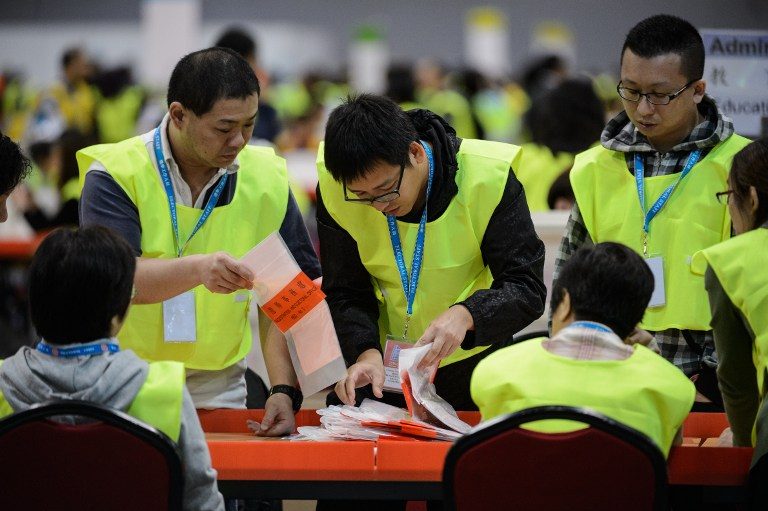SUMMARY
This is AI generated summarization, which may have errors. For context, always refer to the full article.

HONG KONG (UPDATED) – A new generation of young Hong Kong politicians advocating a break from Beijing became lawmakers for the first time Monday, September 5, in the biggest poll since mass pro-democracy rallies in 2014.
A record 2.2 million people voted in the city-wide legislative election as fears grow that Beijing is tightening its grip on the semi-autonomous city in a range of areas, from politics to education and media.
As results rolled in, 4 of the new breed of candidates calling for more autonomy from China were confirmed to have won seats, with a fifth also on course for victory.
Among them was Nathan Law, 23, leader of the 2014 “Umbrella Movement” rallies, who came second in his constituency behind a pro-Beijing candidate.
Law and his new party Demosisto are calling for a referendum on independence, emphasizing Hong Kongers’ right to choose whether they want to split.
“I think Hong Kongers really wanted change,” Law said, celebrating his win.
“Young people have a sense of urgency when it comes to the future.”
With the pro-democracy camp split between those who back the idea of possible independence and those who are more wary of the once taboo notion, Law said he would seek to unify the different camps.
“We have to be united to fight against the (Chinese) Communist Party,” he told Agence France-Presse.
Law will now take up a seat in the Legislative Council (LegCo), Hong Kong’s lawmaking body.
He has previously distanced himself from the more radical “localist” movement, which includes activists who are stridently pro-independence and have previously advocated violence.
The loudest pro-independence voices were banned by the government from standing in the vote, a move which triggered widespread anger.
Beijing and Hong Kong authorities have repeatedly railed against the concept of independence as unconstitutional.
However, some localists who were allowed to take part continued to call for independence on the campaign trail.
One of them, Yau Wai-Ching of new party Youngspiration gained a seat saying Hong Kong had “the right to discuss its sovereignty”.
Another Youngspiration candidate, Baggio Leung, who has openly supported independence, also looked likely to win a seat as the count neared completion.
Beijing bias
Most established pro-democracy politicians do not support the notion of independence and there were concerns in the democratic camp that new activists would split the vote, triggering overall losses.
If the democrats were to lose 4 seats, they would forfeit the 1/3 voting bloc they need to veto bills, stacking the already skewed legislature even more in favor of Beijing.
However, results so far show they are likely to hold on to that veto power, although some veteran democrat campaigners were voted out to make way for the new guard.
The overall make-up of the LegCo remains weighted towards Beijing under a system that makes it almost impossible for the democracy camp to take a majority.
Thirty of the council’s 70 seats are elected by special interest groups representing a range of businesses and social sectors. Those seats go predominantly to pro-Beijing candidates.
Hong Kong was handed back to China by Britain in 1997 under a “one country, two systems” agreement intended to protect its freedoms and partial autonomy for 50 years. However, many young campaigners believe that deal has failed.
A range of new parties grew out of the failure of the 2014 pro-democracy rallies to win concessions from Beijing on political reform. Since then, discussion of independence is now central to political debate.
Young activists have also been galvanized by incidents which have indicated increased Beijing interference.
The most high-profile was the disappearance of five city booksellers known for salacious titles about Beijing politicians. They resurfaced in detention on the mainland.
Almost 60% of 3.7 million voters came out to vote in the LegCo poll. That compares with 53% in the last LegCo elections in 2012. – Rappler.com
Add a comment
How does this make you feel?
There are no comments yet. Add your comment to start the conversation.